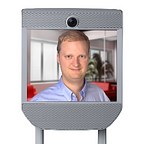The magic of coding
Why programmers are the modern-day wizards
Earlier this summer, I spoke with a class of high school students in the Girls Who Code program. (Amazing program, by the way.) Not wanting to sound like a boring old guy, I tried to capture the essence of why I’ve always loved writing code.
To me, it’s magical.
Unfortunately, Hollywood still tends to portray programmers as over/underweight, bespectacled, Doritos-munching, Coke-drinking nerds. I guess this trope is easy and popular with mainstream consumers.
I think a more appropriate characterization, though, is a wizard. Someone like Gandalf, who can make amazing things happen, and has spent a lifetime learning and refining his powers.
In the world around us, more and more objects are computers, or have computers inside them. Not just PCs and phones, but cars, airplanes, watches, garage door openers, refrigerators, and even toasters.
And these objects all run software.
That’s why the ability to write code is like magic — it gives you ability to make things move, to give them life. Even the most sophisticated robot is just a hunk of wires, silicon, metal, and plastic until you write some code. I remember my first time at Willow Garage writing code for a PR2. The feeling of typing some words, then seeing a human-like robot spring to life, felt, well magical.
Learning and understanding computer programming gives you tremendous powers to do things in the world—make things fly, interact with people, entertain, provide comfort and care. As computing technology evolves, these powers will only grow.
Don’t you want to be a wizard?
